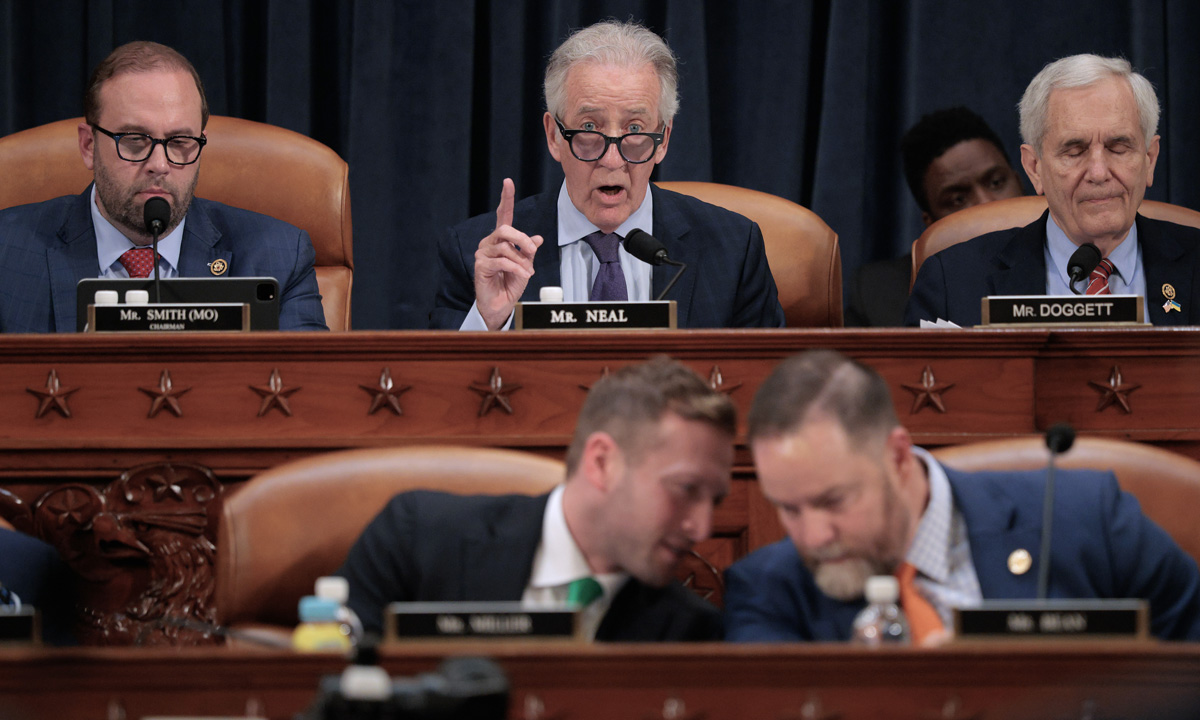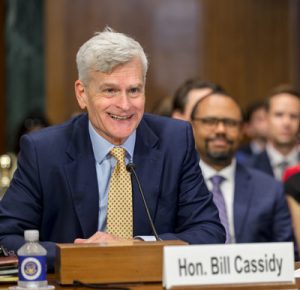‘A True Game Changer’: Unprecedented School Choice Tax Credit Part of GOP Bill
The $5B measure could expand private school choice to all 50 states and stands a better chance of passing than earlier federal attempts.

Get stories like this delivered straight to your inbox. Sign up for The 74 Newsletter
Updated, May 19
Late Sunday night, the House Budget Committee passed a major GOP tax bill after four hard-line Republicans, who had previously stood in opposition, changed their vote to “present,” according to reporting from The Washington Post. The massive bill, which contains the Educational Choice for Children Act, now heads to the House floor where a slim GOP majority means leadership can afford to lose the votes of only two Republican lawmakers to move the measure forward to the Senate.
Updated, May 16
Four hard-line House Republicans joined all Democrats Friday in killing the GOP tax bill, which contained the Educational Choice for Children Act, according to the Associated Press. The lawmakers argued as it stands, the tax cuts would only add to the nation’s $36 trillion debt and said they’d need to see larger spending cuts to vote in favor. The 16-21 Budget Committee vote rejecting the One Big Beautiful Bill Act complicates Speaker Mike Johnson’s goal of approving the measure before Memorial Day.
Clarification appended
A historic bill creating a first-of-its-kind, nationwide tax credit scholarship program to expand private school choice is part of a sweeping Republican tax bill approved by the House Ways and Means Committee Wednesday.
“It is a true game changer that we think would really supercharge school choice across the country,” said John Schilling, senior advisor for the American Federation for Children, a conservative school choice advocacy group.
The Educational Choice for Children Act would provide money to families in all 50 states making less than three times their area’s median income. The recipients, including families who homeschool, could spend it on a large range of education-related expenses, including private and parochial school tuition, books and other instructional material, online classes, private tutoring, fees for dual enrollment and educational therapies.
The measure would create $5 billion in annual tax credits starting next year for individuals who donate cash or stocks to nonprofit Scholarship Granting Organizations, which have discretion over handing out the funds. Donors would receive an unprecedented 1:1 return, allowing them to reduce their taxable income by $1 for every dollar donated, up to $5,000 or 10% of their adjusted gross income.

Currently, 1.2 million students are being served by 76 private school choice programs enacted in 34 states, according to Patrick Wolf, graduate director of the Department of Education Reform at the University of Arkansas. Those programs include vouchers, which give parents public money directly for private school tuition, and Education Savings Accounts, which set aside public money for a range of educational expenses. Twenty-one of those states already have tax credit scholarship programs, according to EdChoice. That number might be about to radically change.
“If the ECCA is enacted and the maximum amount of tax credits … are claimed through individual donations, basically the number of students being supported by private school choice programs across the country would double in one year,” Wolf told The 74. “A 100% increase in a single year in the number of people being served by private school choice programs. That’s a big deal.”
Pro-choice advocates and conservative leaders celebrated the bill’s advancement, arguing it will give unprecedented school choice access to families across the country who have historically been locked out, including in Democratic-controlled states where lawmakers generally oppose private school choice. Children, they say, will finally have the opportunity to be matched with the learning environment and tools that suit them best, largely regardless of how much money their parents make. And the tax incentives will allow individuals to fund it.
Meanwhile, critics expressed serious concern, claiming the far-reaching measure would essentially use taxpayer money to fund largely unregulated private schools primed for discrimination and that loopholes in the bill allow for a system akin to a tax shelter. They also argue wealthier individuals in urban areas — both those donating and those receiving funds — stand to benefit the most, while those in underserved rural areas could be harmed.
And, they say, the $5 billion in taxes the government will lose out on has to come from somewhere and will likely drain resources from public schools, which serve the majority of U.S. students.

“This would be a backdoor way of creating what is essentially a very large, nationwide private school voucher program, and it would be created by sneaking it into this big budget reconciliation bill,” said Jon Valant, senior fellow at the Brookings Institution, who authored a report arguing against the measure. “It may very well pass without most Americans knowing what it is and what it does.”
Because the choice act is part of the fast-track budget reconciliation process, it faces an easier road to passage in the Senate, requiring a simple 51-vote majority, rather than 60, and is not subject to stalling by the filibuster. In the House, where Republicans hold a slim majority, Speaker Mike Johnson has said he expects to have the budget bill done by Memorial Day.
With a $5 billion cap, Valant pointed out, the tax credit scholarship “would overnight become one of the largest federal education programs that we have. As one of those programs, it just doesn’t meet the kinds of standards that I think we should expect for public spending in education.”
While public funding of school choice has been around since at least the late ’90s, he said there’s been a shift in the philosophy and incentives behind the measures. Historically, they were far more targeted to lower-income students or those with disabilities.
But, “this newer wave of private school choice policies reflects very different motivations,” he said, arguing that when programs have almost-universal eligibility and are set up in ways that help wealthier people, “it’s really not at all equity- and opportunity-motivated policy.”
One way families with greater wealth are incentivized to donate? Stockholders stand to benefit through a loophole that would exempt them from paying capital gains taxes. For example, if an individual were to donate $10,000 worth of stock that they had originally purchased at $2,000, they’d still get back the full $10,000 in tax credits without ever having to pay capital gains on the $8,000 profit.
If the choice act passes, it would run through 2029, with the ability to increase the cap by up to 5% each year. It’s part of the 389-page “one big, beautiful bill” approved by the House Ways and Means Committee Wednesday after a marathon six-hour hearing by 26-19 vote along party lines. Among many other provisions, the controversial bill would make Trump’s 2017 tax cuts permanent, cut funding to Medicaid and food stamps and extend the current $2,000 Child Tax Credit while raising it to $2,500 per child through 2028.
The specifics for the tax credit scholarship in the omnibus tax bill differ from the original act introduced in January in three major ways: the $10 billion cap has been cut in half; only individual taxpayers, not corporations, are eligible to donate; and participating private and parochial schools must follow and provide mandated services and accommodations to special education students as outlined in their Individualized Education Program.
“That’s a huge regulatory burden for small private schools, and in a sense, is potentially a poison pill for the legislation,” Wolf said.

Advocates for students with disabilities maintain that the choice act does not provide the same regulatory protections to special education students in private and parochial schools as those received by special education students in public schools under the Individuals With Disabilities Education Act.
Experts emphasized that the bill must still go through multiple committees and the reconciliation process, so is subject to significant changes. Pro-choice advocates in particular are hoping the final language more closely mirrors that of the original bill, which allowed corporations to participate and did not require private and religious schools to comply with a student’s IEP.
A version of the bill was introduced under the first Trump administration but didn’t really gain momentum at the time. A new version was re-introduced this January by Sen. Bill Cassidy, the Louisania Republican who chairs the Senate education committee, and a number of his colleagues.
“For years I’ve advocated for school choice with my Educational Choice for Children Act. I am pleased to see it included in the big, beautiful bill,” Cassidy said in a statement. “Expanding President Trump’s tax cuts is about preserving the American Dream. Giving parents the ability to choose the best education for their child makes the dream possible.”
Clarification: The story has been updated to more precisely reflect the language in the Educational Choice for Children Act around private and parochial schools’ obligation to provide services to special education students.
Get stories like these delivered straight to your inbox. Sign up for The 74 Newsletter

;)
